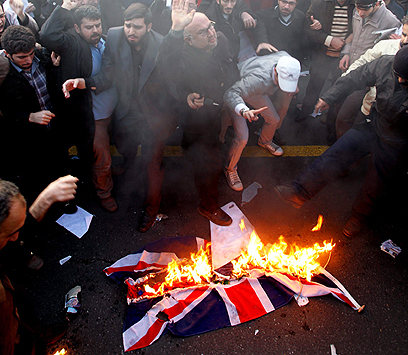UPDATES
US and EU place tougher sanctions on Iran
December 2, 2011 | Sharyn Mittelman

Following the Iranian ‘mob’ attack on the British embassy, France, Germany, Italy and the Netherlands have recalled their ambassadors temporarily from Iran. The UK immediately closed its embassy in Iran and ordered Iran’s dipxlomatic staff to leave London.
A meeting of EU foreign ministers in Brussels condemned the attack on the British embassy, and announced new sanctions aimed at Iran’s nuclear program.
The new economic and travel sanctions will freeze the assets of 143 companies and ban 37 Iranian nationals described as “directly involved in Iran’s nuclear activities” from entering the EU. They also agreed to consider further punitive measures focused on Iran’s banking, transport and energy sectors.
However, the EU did not follow Britain, Canada and the US which severed all dealings with Iran’s Central Bank.
France has also been urging collective EU action to follow the British example and also to stop oil imports from Iran. There was resistance from southern European countries notably Greece, which buys most of its oil from Iran. EU members buy 450,000 barrels of Iranian oil a day, about 18% of the country’s exports. EU Diplomats said there would be discussions within the EU over alternative suppliers from the Gulf before the next package of sanctions is drafted in January.
The US Congress also seems poised to push stronger action on Iran. On December 1, the US Senate unanimously approved tougher sanctions against Iran, voting to penalise foreign financial institutions that do business with Iran’s Central Bank – the main conduit for its oil revenues. The US already bans its own banks from dealing with the Iranian Central Bank, so US sanctions would operate by dissuading other foreign banks from doing so by threatening to cut them off from the US financial system.
The Senate acted despite concerns from Obama administration officials. On November 21, the US, Britain and Canada announced new sanctions on Iran’s energy and financial sectors, but the Obama administration stopped short of targeting Iran’s Central bank, a step that US officials said could severely raise oil prices and jeopardise global economic recovery. The Senate amendment provides a six-month grace period before sanctions would start for petroleum transactions with Iran’s Central Bank, a move designed to give world oil markets time to adjust. It includes a “waiver” that allows the President suspend the sanctions if deemed vital to US national security. The sanctions imposed must still pass the US House of Representatives to become law.
According to the Jerusalem Post sanctions have already complicated Iran’s oil trade. Last December, India’s Central Bank ended a clearing house system with Iran, forcing refiners to arrange other means of payment in order to keep shipments flowing. It is unclear whether further sanctions on financial dealings would affect shipments to countries like China, Iran’s biggest buyer.
If sanctions against Iran are to work, there is an urgent need for international cooperation on tough sanctions to deter Iran from its nuclear ambitions. However, China and Russia have been reluctant to join the effort – which not only undermines proceedings in the Security Council but also the impact of sanctions. China has called for calm, warning against “emotionally charged actions”. Similarly Russia has said: “We speak out categorically against cranking up a spiral of tension and confrontation on issues linked with Iran. We believe that this … is fraught with severe consequences.”
Iran has continued to deny that it is building nuclear weapons for military use despite an International Atomic Energy Agency’s (IAEA) report released in November, which found evidence to the contrary.
In addition, Iran’s genocidal intent against Israel is also clear. Michael Rubin, a resident scholar at the American Enterprise Institute and an expert on Iran writes in Commentary:
“Islamic Revolutionary Guard Corps Gen. Hassan Tehrani-Moghadam died in a mysterious explosion last month reportedly after having achieved a breakthrough in Iran’s ballistic missile program. While Iran’s apologists repeatedly deny the Islamic Republic has genocidal intent against Israel, the reality is quite different. According to the website of the Student Basij, which earlier this week published Moghadam’s last will and testament, Moghadam had declared in it: ‘Write on my tombstone: This is the grave of someone who wanted to annihilate Israel.’ In 1990, policymakers dismissed Saddam’s threats against Kuwait as merely rhetorical flourish. With Iran apparently experimenting with nuclear technology that has nothing to do with energy production, and with statements such as Moghadam’s, perhaps it’s time to take Iran at its word when it comes to its leadership’s genocidal intent.”
Israeli officials have indicated it may only be a matter of months before Iran’s nuclear weapons program become too advanced to stop via a military strike. It appears that in order to avoid a choice between military intervention and allowing Iran to go nuclear, with all the disasterous implications this entails, there is an urgent need for international cooperation to effect tough sanctions that will “raise the cost of Iran’s nuclear program beyond the breaking point.”
Sharyn Mittelman
Tags: Europe





